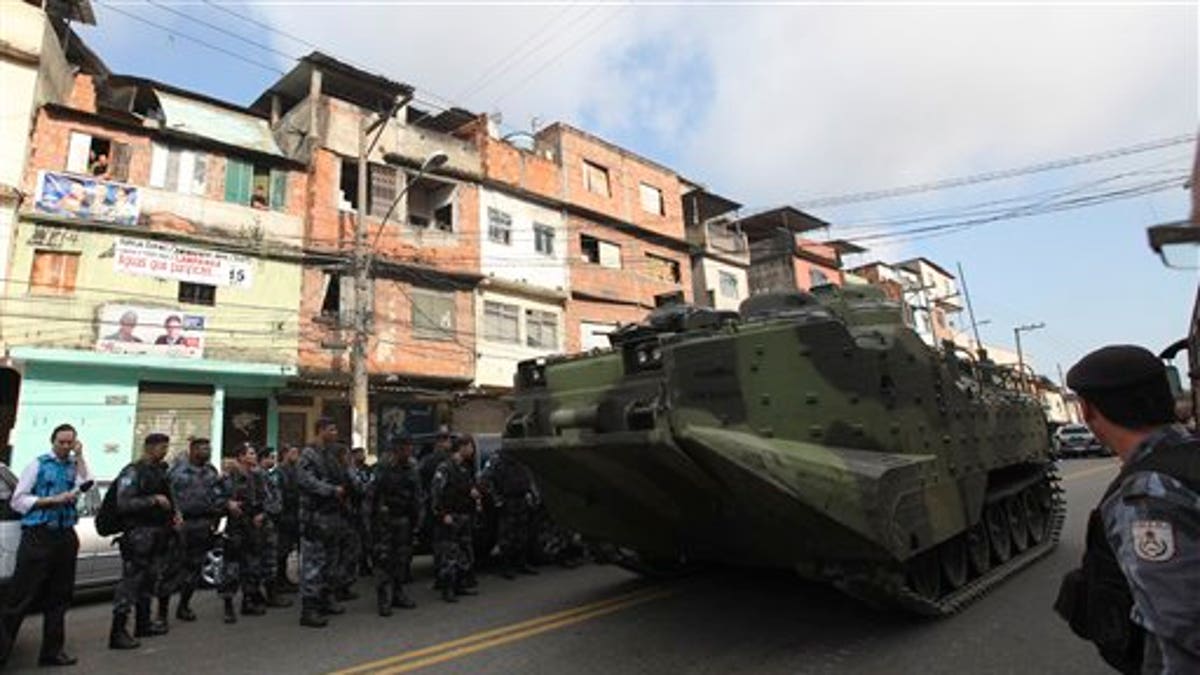
Soldiers stand next to an armored vehicle during a police operation against drug traffickers at the Complexo do Alemao slum in Rio de Janeiro, Brazil, Sunday, Nov. 28, 2010. Rio police backed by helicopters and armored vehicles, started invading a shantytown complex long held by traffickers on Sunday, slowly moving their way through small alleys amid heavy gunfire. (AP Photo/Andre Penner)
It was like a scene out of a movie. But it was all too real.
Río police backed by helicopters and armored vehicles invaded a shantytown complex long held by traffickers on Sunday, quickly taking over the key drug gang stronghold in a historic victory for the city hosting the 2016 Olympics.
Black-clad officers from elite police units seized the Alemáo slum complex amid heavy fire, with police and army helicopters flying low to support the men on the ground. But the officers encountered less resistance than expected, even if many gang members still remained inside.
"We won," said Mário Sérgio Duarte, head of Río state's military police. "We brought freedom to the residents of Alemáo."
The operation was crucial to the city's campaign to push criminals out of slums where they have ruled with impunity, an effort to secure Rio before the city hosts World Cup matches in 2014 and the 2016 Olympics.
The operation came after gangs unleashed a week of violence in the city, with more than 100 cars and buses set on fire and at least 35 deaths, mostly of suspected traffickers. The burning of vehicles had become a hallmark of the gangs' bloody protest against the tougher policing program.
There were no immediate reports of injuries in Sunday's invasion, which began just after sunrise. Police said they captured large amounts of weapons, ammunition and drugs in the complex, which includes a dozen slums that are home to at least 85,000 people.
"When we got in, it was a critical moment, but we now we have control of the territory, it's all calm," police inspector Rodrigo Oliveira said. "There is no doubt that Río residents have reason to celebrate today. The complex was seen as a fortress for drug traffickers and in less than two hours we took control."
Some gunmen began to surrender and some were arrested, but police were still searching the shacks on the hills of the shantytown to try to find those trying to flee.
"We have to be careful because they may be trying to set up traps for our men," Duarte said. But he promised that "we won't leave a place unchecked."
At least five police helicopters were buzzing above the Alemáo searching for gang members.
Police and troops moved into the slum inside armored vehicles as residents watched from their windows in shacks packed along the hills. Big tracked armored personnel carriers rolled in and out of the slum entrances, carrying soldiers with painted faces.
Vehicles from the forestry service carried troops to the jungle areas inside the slum to cut back trees and eliminate possible escape routes.
Many residents were thrilled with the police operation.
"Fantastic, this is exactly the thing we needed," said Ana Costa, 48, who lives a block from the slum in the Penha neighborhood.
"This community has been so violent for so long that I never thought that I would see this day," she said as armored vehicles rushed by her house. "I still have my doubts, but I'm praying that peace has finally come here."
Hundreds of soldiers in camouflage and elite and regular police had been surrounding the Alemáo since Saturday night, sheltering behind the armored vehicles. They had exchanged intermittent, heavy gunfire with gang members at many of the 44 entrances to the slum where about 600 armed gang members were believed to be trapped.
As the troops and gangsters faced off, Río saw its calmest night in a week, with only one volley of gunfire heard overnight in the slum. For the first time in more than a week, no vehicles were burned.
Police had given gang members until sunset Saturday to surrender, and were said to be exhausted, hungry, thirsty, and stressed out. But they did not give up, so police moved in.
Authorities had already seized the Vila Cruzeiro slum, which was once thought virtually impenetrable. More than 200 armed gang members fled that offensive and ran to the nearby Alemáo.
Rio de Janeiro's governor, Sérgio Cabral, has vowed repeatedly to break the back of drug gangs that have ruled hundreds of shantytowns in the city of 6 million people.
The human rights organization Amnesty International complained that police had been too heavy-handed in their offensive.
Based on reporting by the Associated Press.
Follow us on twitter.com/foxnewslatino
Like us at facebook.com/foxnewslatino
